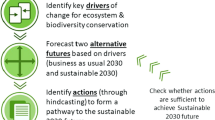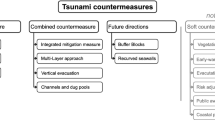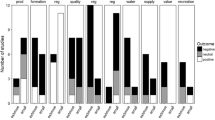Abstract
Incorporating the cost of ecological damage into the pricing of natural resource asset utilization is a critical aspect of reform. Land reclamation from the sea is a usage mode that fundamentally alters the natural attributes of sea areas. Therefore, research on ecological damage compensation for land reclamation is imperative for allocating sea area resources using paid use collection standards. This paper proposes an ecological damage compensation assessment framework that sets the ecological compensation range based on the “opportunity cost” of land reclamation as the lower limit of compensation and the loss of marine ecosystem services and goods as the upper limit, accompanied by empirical research. The results find significant differences in ecological damage across different sea areas, with the minimum loss amount of port and shipping type at 551.70 yuan/ha, and the maximum loss amount of agricultural reclamation type at 2861.47 yuan/ha. Therefore, differentiated ecological compensation and dynamic adjustment of compensation standards are necessary to leverage the market’s economic influence in reclamation management.







Similar content being viewed by others
References
Anne C, Yves M (2021) A policy framework to accommodate both the analytical and normative aspects of biodiversity in ecological compensation. Biol Conserv 253:108897
Benjamin EO, Sauer J (2018) The cost effectiveness of payments for ecosystem services—Smallholders and agroforestry in Africa. Land Use Policy 71:293–302
Bryhn A, Kraufvelin P, Bergström U, Vretborn M, Bergsttrom L (2020) A Model for disentangling dependencies and impacts among human activities and marine ecosystem services. Environ Manage 65:575–586
Cabral P, Levrel H, Viard F, Frangoudes K, Girard S, Scemama P (2016) Ecosystem services assessment and compensation costs for installing seaweed farms. Mar Policy 71:157–165
Chen JF, Ho-Nien H, Quang HD (2015) Evaluating teaching performance based on fuzzy AHP and comprehensive evaluation approach. Appl Soft Comput 28:100–108
Chen L (2016) Study on Multifunctional Effect and Protection Compensation of Cultivated Land in Huang-Huai-Hai Plain. China Agricultural University, PhD dissertation
China Ocean Press (2019) China Marine Statistical Yearbook. Beijing
Claudia C, João Carlos M, Pedro PC, Zara T (2020) Ecosystem services as a resilience descriptor in habitat risk assessment using the InVEST model. Ecological Indicators 8:115
European Commission (2014) Food and agriculture organization, international monetary fund, organization for economic cooperation and development, united nations, world bank. System of environmental-economic accounting experimental ecosystem accounting 20l2, New York
Gao HJ (2021) Research on ecological compensation standard of Dalian Jinshitan national marine park based on CVM. Proceedings of the 7th annual international conference on social science and contemporary humanity development (SSCHD 2021), Advances in Social Science, Education and Humanities Research 610:255–260
He YX (2020) The Research on method of fund compensation for marine ecological damage. J Ocean Univ China (Social Sciences) 172(01):67–74
Lei H, Fang LT, Qian ZM et al (2012) The Quantitative Analysis of Ecological Compensation Responsibility in Watershed. Energy Procedia 16(Part B):1324–1331
Li YF, Xiang ZY, Chen KL et al (2020) An improved spatial subsidy approach for ecological compensation in coastal seascapes for resilient land-sea management. Aust J Environ Manag 276:111305
Liu WF, Zang JY, Liu W, Ran XB (2014) Research progress of marine oil spill ecological damage assessment methods. J Water Ecol 35(01):96–100
Meng WQ, Hu BB, He MX et al (2017) Temporal-spatial variations and driving factors analysis of coastal reclamation in China. Estuar Coast Shelf Sci 191(May15):39–49
Miao FM, Zhao QM (2007) Theory and method of sea area classification and value evaluation. Ocean Press, Beijing
Ministry of Ecology and Environment (1997) Seawater quality standard. Ministry of ecology and environment publication, Beijing
Ministry of Finance of the People’s Republic of China, State Oceanic Administration (2018) Adjusting the usage fee collection standard for sea areas and uninhabited islands. Beijing
National Bureau of Statistics (2020) China Statistical Yearbook. China statistics Press, Beijing
Panchal S, Shrivastava AK (2022) Landslide hazard assessment using analytic hierarchy process (AHP): A case study of National Highway 5 in India. Ain Shams Eng J 13:101626
Shang WX, Gong YC, Wang ZJ, Stewardon M (2018) Eco-compensation in China: Theory, practices and suggestions for the future. J Environ Manag 210(MAR.15):162–170
Shojaie A, Yarali N, Gholami DM et al (2021) Valuation of ecosystem functions and services: Dehdez forest in Iran. Scand J For Res 26(5):358–366
State Forestry Administration (2008) Specifications for assessment of forest ecosystem services in China. State Forestry Administration Publication, Beijing
State Oceanic Administration (2002a) Marine Biological Quality. State Oceanic Administration Publication, Beijing
State Oceanic Administration (2002b) Marine Sediment Quality. State Oceanic Administration Publication, Beijing
State Oceanic Administration (2006) Industrial classification for ocean industries and their related activities. State Oceanic Administration Publication, Beijing
State Oceanic Administration (2009) Classification of Sea Area Use. State Oceanic Administration Publication, Beijing
State Oceanic Administration (2011) Technical guidelines for marine ecological capital assessment. State Oceanic Administration Publication, Beijing
State Oceanic Administration (2012) National Marine Functional Zoning (2011–2020). Ocean Press, Beijing
State Oceanic Administration (2019) China Marine Statistical Yearbook. China Ocean Press, Beijing
Thapa S, Wang L, Koirala A et al (2020) Valuation of ecosystem services from an important wetland of nepal: a study from begnas watershed system. Wetlands 40:1071–1083
Villarroya A, Barros AC, Kiesecker J (2014) Policy development for environmental licensing and biodiversity offsets in Latin America. PLoS ONE 9(9):e107144
Wang T, He GS, Zhou QL, Gao JZ, Deng LJ (2018) Designing a framework for marine ecosystem assets accounting. Ocean Coast Manag 163:92–100
Wang T, He GS, Deng LJ, Zhao R, Yang L, Yin Y (2021) The framework design and empirical study of China’s marine ecological-economic accounting. Ecol Ind 132:108325
Wang Y, Yang R, Li X, Zhang L, Liu W, Zhang Y, Liu Y, Liu Q (2021) Study on Trans-Boundary Water Quality and Quantity Ecological Compensation Standard: A Case of the Bahao Bridge Section in Yongding River. China Water 13(11):1488
Wang T, He GS (2018) Research on the pricing of China’s sea resources assets. Mar Sci Bull 37(1):1–8
Wei XY, Xia JX (2012) Ecological compensation for large water projects based on ecological footprint theory: a case study in China. Procedia Environ Sci 13(10):1338–1345
Yang Y, Yao CX, Xu DL (2020) Ecological compensation standards of national scenic spots in western China: a case study of Taibai Mountain. Tourism Management 76:103950.1–103950.17
Yu QS, Qi LM (2006) Theoretical study of sea area assessment. Ocean Press, Beijing
Yu CY, Liang B, Han GC, Huo CL, Zhang ZF, Ma MH (2015) Discussion on procedures and methods of marine oil spill ecological damage assessment. Ocean Dev Manag 32(01):92–96
Zhang AG, Yin J, Wang LL et al (2020) Ecological damage assessment and compensation for reclaimed coastal pond aquaculture: A case study in Qingduizi Bay, China. Aquac Res 51(5):2091–2101
Zhao L (2021) Present situation, problems and countermeasures of marine ecological compensation in China. J Dalian Marit Univ (Social Science Edition) 20(01):68–74
Zhao CW, Wang SJ (2010) Benefits and standards of ecological compensation-international experience and its enlightenment to China. Geogr Res 29(04):597–606
Author information
Authors and Affiliations
Corresponding author
Additional information
Publisher's Note
Springer Nature remains neutral with regard to jurisdictional claims in published maps and institutional affiliations.
Rights and permissions
Springer Nature or its licensor (e.g. a society or other partner) holds exclusive rights to this article under a publishing agreement with the author(s) or other rightsholder(s); author self-archiving of the accepted manuscript version of this article is solely governed by the terms of such publishing agreement and applicable law.
About this article
Cite this article
Tao, W., Lu, Y., Lijing, D. et al. An empirical study of the design of an ecological damage compensation assessment framework for land reclamation from the sea. J Coast Conserv 27, 21 (2023). https://doi.org/10.1007/s11852-023-00945-z
Received:
Revised:
Accepted:
Published:
DOI: https://doi.org/10.1007/s11852-023-00945-z




